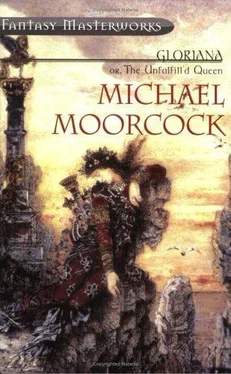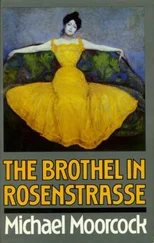Michael Moorcock - Gloriana
Здесь есть возможность читать онлайн «Michael Moorcock - Gloriana» весь текст электронной книги совершенно бесплатно (целиком полную версию без сокращений). В некоторых случаях можно слушать аудио, скачать через торрент в формате fb2 и присутствует краткое содержание. Жанр: Фэнтези, на английском языке. Описание произведения, (предисловие) а так же отзывы посетителей доступны на портале библиотеки ЛибКат.
- Название:Gloriana
- Автор:
- Жанр:
- Год:неизвестен
- ISBN:нет данных
- Рейтинг книги:5 / 5. Голосов: 1
-
Избранное:Добавить в избранное
- Отзывы:
-
Ваша оценка:
- 100
- 1
- 2
- 3
- 4
- 5
Gloriana: краткое содержание, описание и аннотация
Предлагаем к чтению аннотацию, описание, краткое содержание или предисловие (зависит от того, что написал сам автор книги «Gloriana»). Если вы не нашли необходимую информацию о книге — напишите в комментариях, мы постараемся отыскать её.
Gloriana — читать онлайн бесплатно полную книгу (весь текст) целиком
Ниже представлен текст книги, разбитый по страницам. Система сохранения места последней прочитанной страницы, позволяет с удобством читать онлайн бесплатно книгу «Gloriana», без необходимости каждый раз заново искать на чём Вы остановились. Поставьте закладку, и сможете в любой момент перейти на страницу, на которой закончили чтение.
Интервал:
Закладка:
He pulled her down to the cushions. He spread her legs. He ripped away his britches to reveal what she had seen so many times before. She refused to weep, though tears threatened. He entered her. Over his shoulder she saw the knife, sheathed at his belt. She reached for it and found it. She drew it forth as he grunted and cursed and kissed and heaved. She raised it, looking beyond him into the candlelight and a sudden image of blood-stained stone, sharp and black and hard as it appeared so frequently in her dreams. The image melted. She cared for nothing but herself. And then she began to tremble, thinking that the whole palace quaked, that the roof must fall. And she gasped. Little, surprised, childish sounds came from her throat. Her body was filled with stinging heat. “Oh!” Wondering, she kissed him. “Quire!”
She shook so mightily and knew so much joy as if she received recompense for every failure she had ever known, that she screamed a high wavering scream which filled the roof and rang throughout the entire palace, perhaps through Albion, as she came.
And the dagger she still held in her hand was brought down with tremendous force, to pass through soft silk and to snap upon the stones of her seraglio.
Quire jumped back, careless of his own unfinished pleasure, and his face was suddenly quite innocent; it seemed every sin had been removed from his soul at once. And he laughed loudly, into the dying echo of her cry. “Ha! Gloriana!”
Then she began, with such utter happiness, to weep.
“Oh, Quire. We are both redeemed.”
THE THIRTY-FIFTH CHAPTER
As the warmth of autumn shall give way at last to the cool of winter, so shall the Moon of Romance be married to the Sun of Reason and Gloriana, Queen of Albion, be wed to her Prince Arthur of Valentia, causing much celebration throughout the Empire, for it shall be revealed, by way of Sir Thomasin Ffynne, the Queen’s High Admiral, that Captain Arturus Quire was, in fact, his ward-the last surviving nephew of Lord Montfallcon, whose family was slain by King Hern. The tale of Captain Quire’s commoner’s upbringing and how he came to Court, taking part in a pageant and winning the attention, and later the love, of the Queen, shall be on all lips, as shall its sequel, of how Quire’s enemies grew jealous of him, how poor Lord Montfallcon, not realising Quire’s true birth, schemed against him and others, including Sir Thomas Perrott, then killed himself when he realised the truth, that he had sought to destroy his own nephew. It shall be told how Quire almost singlehandedly saved the Realm and brought reconciliation to the Queen, to the rival factions, to Albion and to the world itself.
Chivalry shall flourish again, but it shall be of a more practical order under Prince Arthur’s influence, for he will reduce a little of the romance (feeling his own tale, perhaps, to contain enough of that) and increase the realism, so that honour shall be seen to be at once a stranger and more ordinary thing than many previously knew.
They shall be married in November, in time to begin a Progress throughout the Realm, to span the Yuletide season. And, while they are gone, the walls of the great palace shall be revealed, with all their antique rooms, and light brought to every corner, and the vagabonds still dwelling there shall be made comfortable in hostelries especially prepared for them, and large parts of the once hidden palace shall be opened to the citizens of London, for their recreation.
Prince Arthur and Queen Gloriana shall begin their Progress by taking the State Barge, the old Golden Barge of the Queen’s ancestors, down the river towards the sea, there to guest with Sir Amadis Cornfield and his Perrott kinsmen, whose lands abound the great estuary. They shall sail from the dock at Charing Cross, on their high, golden galley, between embankments lined with bare elm trees. Through the rich, dead leaves hiding the hooves of their brown and black horses, knights shall ride on both sides, escorting the barge. The knights shall wear armour of dark gold and silver, their surcoats shall be russet, and their upright lances shall bear all the great Chivalric arms of Albion. And the Queen shall look down the river, beyond London’s walls, to where the hills are, dark green and yellow, and she will turn to her Consort, who shall wear black velvet and an awkward crown of near-black rubies and gold, and she will hug him and say to him: “Oh, my love! What a sober little King you have become!”
And behind them will be the palace, with its glinting domes and roofs rising and falling like a glamorous tide; its towers and minarets lifting like the masts and hulks of sinking ships.
APPENDIX A
ALTERNATE CHAPTER THIRTY-FOUR
Albion, with war banished and the Arabian fleet dispersed even before Tom Ffynne and the Perrotts could meet with it, knew optimism again as Chivalry was at least restored. The Queen made plans for a Progress, regretting only that the Countess of Scaith could not accompany her. Sir Orlando Hawes proposed marriage to Alys Finch and was accepted. He had found the innocent in her, now that Quire’s influence was gone. Sir Amadis Cornfield and his wife were invited to the palace and came, to receive token recrimination, though the Queen’s main purpose was to offer this new, sober Sir Amadis the position of Chancellor, which carried with it an earldom. Sir Amadis begged leave to return to Kent. He said he had lost his taste for statecraft. And Gloriana was alone, as she had never been alone before, and every night she pined for her villainous lover, and her voice was heard through the emptied tunnels and vaults of the hidden palace, the deserted seraglio, as she wept; though she never mentioned his name, even there, in the darkness of her curtained bed. The autumn grew gradually cooler, but the year was still unnaturally warm. Tatary drew back from foreign borders. King Casimir was re-elected Poland’s King. The Lady Yashi Akuya, having lost hope of Oubacha Khan, returned to Nipponia. Hassan al-Giafar was accepted as bridegroom by the Princess Sophie, sister of Rudolph of Bohemia, and Lord Shahryar was recalled to Arabia for execution, seeming distressed when he was reprieved. The last leaves began to fall from the trees and lie in drifts on the paths. Sir Orlando Hawes was made Chancellor, head of the Privy Council, and Admiral Ffynne became, with him, the Queen’s chief adviser. Master Gallimari and Master Tolcharde arranged a further popular display, in the great courtyard, of the mechanical Harlekinade, attended by Queen, nobles and commons. Sir Ernest Wheldrake proposed marriage, in maudlin verse, to Lady Lyst, who drunkenly and cheerfully accepted him. The Thane of Hermiston, who had unwittingly encouraged Montfallcon’s final vengeance, disappeared in Master Tolcharde’s roaring globe and never returned to Albion. Doctor Dee remained in his apartments, refusing visits even from the Queen herself. His experiments, he said, were of major importance and should not be witnessed by the uninformed. He was humoured, though he was by now considered entirely mad. There was speculation about the fate of Montfallcon, whom most thought a suicide, and of Quire, who had evidently fled through the Spider’s Door and returned to the underworld before escaping abroad. The Queen would not speak of either. The Countess of Scaith, as she had promised, said nothing of Quire and refused to accuse him. Sir Thomas Perrott maintained the firm belief that Montfallcon was the villain who had imprisoned him. Sir Orlando Hawes kept silent on the matter for two reasons-his natural tact and his need to protect his bride’s reputation. Josias Priest emigrated to Mauretania.
Читать дальшеИнтервал:
Закладка:
Похожие книги на «Gloriana»
Представляем Вашему вниманию похожие книги на «Gloriana» списком для выбора. Мы отобрали схожую по названию и смыслу литературу в надежде предоставить читателям больше вариантов отыскать новые, интересные, ещё непрочитанные произведения.
Обсуждение, отзывы о книге «Gloriana» и просто собственные мнения читателей. Оставьте ваши комментарии, напишите, что Вы думаете о произведении, его смысле или главных героях. Укажите что конкретно понравилось, а что нет, и почему Вы так считаете.






